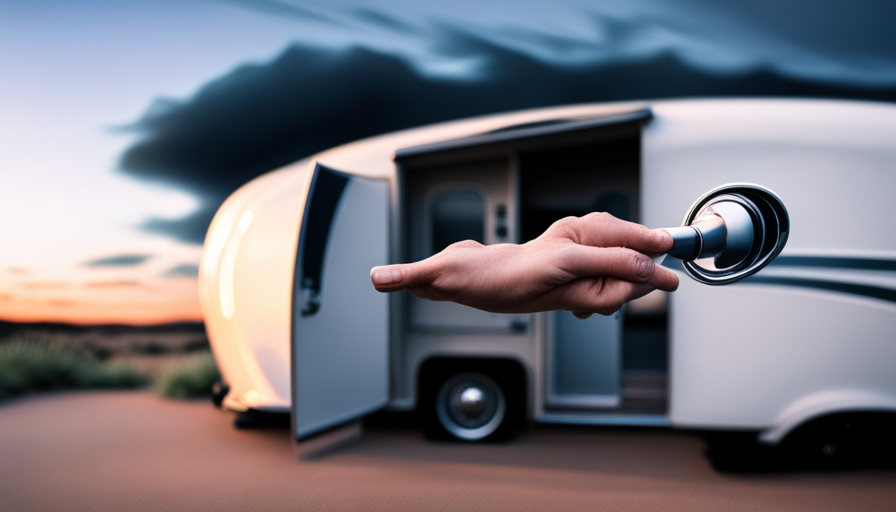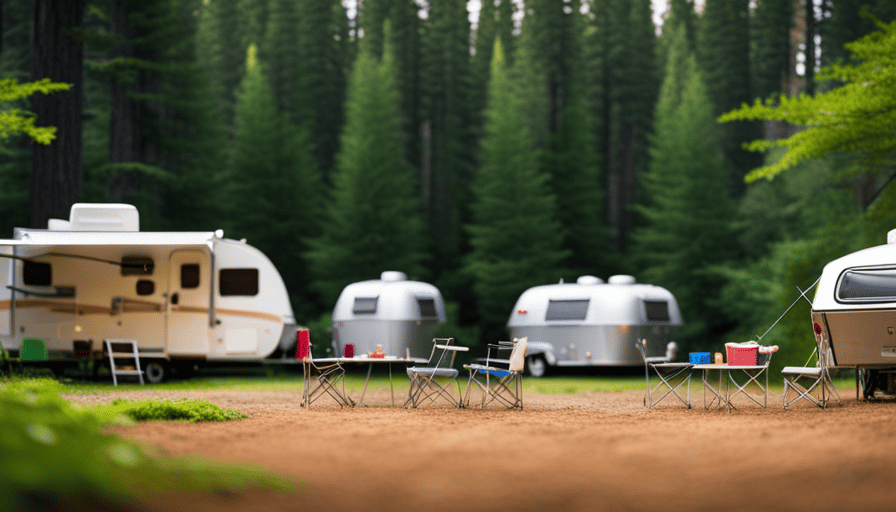So, you’ve decided to store your beloved camper during the off-season. This is a wise choice as it ensures the longevity and functionality of your mobile home.
However, there’s a little problem that often wreaks havoc on our precious campers – those pesky little creatures called mice. Yes, they may be cute in children’s storybooks, but when it comes to invading your camper and leaving behind a trail of destruction, they’re anything but adorable.
But fear not, for I am here to impart upon you the knowledge and techniques to keep those furry intruders at bay. In this article, we will explore a range of practical and effective methods to prevent mice from turning your cherished camper into their cozy little abode.
From inspecting and sealing entry points to using natural deterrents and setting traps, we will leave no stone unturned in our quest to protect your camper from these uninvited guests.
So, grab your notepad and let’s dive into the world of mouse prevention, ensuring that your camper remains a rodent-free haven during its time in storage.
Key Takeaways
- Inspect and seal entry points to prevent mice from entering, paying attention to areas where utility lines or pipes enter the camper.
- Clean and declutter the camper, removing all food and crumbs, and store fabrics properly in sealed plastic bags or containers.
- Use natural deterrents like peppermint oil, dryer sheets, or cayenne pepper, and set traps and baits to catch mice.
- Maintain a clean and dry environment inside the camper, regularly checking for holes or gaps on the exterior and inspecting the interior for signs of mice activity.
Inspect and Seal any Entry Points
Don’t let those pesky mice ruin your camper while it’s in storage – make sure to inspect and seal any entry points! When it comes to pest control methods and rodent proofing techniques, prevention is key.
Mice can squeeze through tiny openings, so it’s essential to thoroughly examine your camper for any potential entry points. Start by inspecting the exterior walls, windows, and doors. Look for gaps, cracks, or holes where mice could enter. Pay close attention to areas where utility lines or pipes enter the camper, as these are common entry points for rodents.
Once you’ve identified any potential openings, it’s time to seal them up. Use a high-quality silicone caulk or steel wool to fill in the gaps. These materials are effective at keeping mice out because they can’t chew through them. Make sure to seal any openings around utility lines and pipes with expanding foam or wire mesh.
Additionally, inspect the undercarriage of your camper for any gaps or openings and seal them accordingly.
By taking the time to inspect and seal all entry points, you can greatly reduce the chances of mice getting into your camper during storage. Now that you’ve protected your camper from unwanted visitors, let’s move on to the next step – cleaning and decluttering the camper.
Clean and Declutter the Camper
Ironically, decluttering and tidying up your camper will inadvertently create an unwelcome environment for unwanted guests. By organizing your belongings and removing moisture sources, you can make your camper less appealing to mice during storage.
Here are five practical tips to clean and declutter your camper:
- Remove all food and crumbs: Mice are attracted to food, so make sure to remove any food items and thoroughly clean any surfaces where food may have been.
- Store fabrics properly: Mice like to nest in soft materials, so pack away any blankets, pillows, or curtains in sealed plastic bags or containers.
- Vacuum and mop: Clean all nooks and crannies, paying special attention to areas where crumbs and debris can accumulate.
- Seal off potential entry points: Use steel wool or caulk to seal any cracks or gaps in your camper’s exterior, including around windows, doors, and utility hookups.
- Control moisture: Mice are also drawn to moisture, so fix any leaks and use dehumidifiers or moisture-absorbing products to keep the camper dry.
By following these steps, you can create an environment that’s less attractive to mice.
In the next section, we’ll explore natural deterrents to further prevent these unwanted guests from entering your camper.
Use Natural Deterrents
Enhance your camper’s defense against unwanted guests by incorporating natural deterrents that’ll make them think twice about entering your space. Natural alternatives are a great way to keep mice out of your camper during storage without the use of harmful chemicals.
One effective DIY deterrent is peppermint oil. Mice dislike the strong scent of peppermint, so placing cotton balls soaked in peppermint oil around your camper can help keep them away.
Another option is to use dryer sheets. Mice have a strong aversion to the smell of dryer sheets, so tucking them into corners and crevices can be an effective deterrent.
Additionally, you can sprinkle cayenne pepper or chili powder around the perimeter of your camper. The strong smell and spicy taste will deter mice from entering.
These natural options are not only safe but also cost-effective. By incorporating these DIY deterrents, you can significantly reduce the likelihood of mice infestation in your camper.
However, if natural deterrents alone aren’t sufficient, it may be necessary to set traps and baits to completely eliminate the risk of mice entering your camper during storage.
Set Traps and Baits
To effectively address the issue, you can set traps and baits, like a hunter setting a snare to catch its prey. Using effective traps and safe baits is crucial in keeping mice out of your camper during storage. Let’s take a closer look at some options:
| Trap Type | Description |
|---|---|
| Snap Traps | These traps are spring-loaded and snap shut when a mouse triggers them. They are effective in catching mice quickly and humanely. |
| Glue Traps | Glue traps are coated with a sticky substance that traps mice when they walk over it. They are non-toxic and easy to use, but may not be as effective in catching larger mice. |
| Live Traps | Live traps allow you to catch mice alive and release them elsewhere. They are a humane option but require you to check the traps regularly to ensure the captured mice are released promptly. |
| Electronic Traps | These traps deliver a high-voltage shock to instantly kill the mouse. They are fast and efficient, but may require batteries or a power source. |
When setting traps, it’s important to place them in areas where mice are likely to travel, such as along walls or near entry points. Additionally, selecting safe baits is crucial in attracting mice to the traps. Some effective bait options include peanut butter, chocolate, or bacon.
In the next section, we will discuss how to store food properly to further prevent mice from being attracted to your camper.
Store Food Properly
Properly storing food in your camper is essential to prevent attracting unwanted guests. To prevent infestation, it’s crucial to store food in airtight containers made of materials that mice can’t chew through, such as glass or metal. This will ensure that the tempting aroma of food doesn’t escape and lure rodents.
Additionally, avoid leaving any food out in the open, as even small crumbs can be enticing to mice. Instead, place all perishable items in the refrigerator or freezer, and securely seal dry goods in cabinets or pantry areas.
In addition to storing food properly, it’s equally important to practice proper waste disposal. Mice are attracted to food scraps and leftovers, so disposing of them promptly and correctly is essential. Make sure to seal garbage bags tightly and dispose of them in a secure outdoor trash bin. Avoid leaving any food waste inside the camper, as this can quickly become an invitation for mice to enter.
By following these guidelines for food storage and waste disposal, you can effectively prevent mice from infesting your camper during storage. However, if you want an extra layer of protection, consider using rodent repellents. These will be discussed in the next section, providing further strategies to keep those pesky rodents at bay.
Use Rodent Repellents
Don’t bother with those cute little mouse-shaped welcome signs for your camper, because rodent repellents are about to become your new best friends. When it comes to keeping mice out of your camper during storage, there are two effective options: natural repellents and electronic deterrents.
Natural repellents are a great choice for those who prefer a chemical-free approach. Peppermint oil is known for its strong scent that mice find repulsive. Simply soak cotton balls in peppermint oil and place them strategically around your camper. Another natural option is using dryer sheets, as the strong smell can deter mice from entering.
On the other hand, electronic deterrents use ultrasonic sound waves to repel mice. These devices emit high-frequency sounds that are unpleasant for rodents, but inaudible to humans. They are easy to use, simply plug them into an electrical outlet and let them do their job.
To help you choose the best repellent option, here is a comparison table:
| Natural Repellents | Electronic Deterrents |
|---|---|
| Peppermint oil | Ultrasonic sound waves |
| Chemical-free | Easy to use |
| Strong scent | Inaudible to humans |
By using natural repellents or electronic deterrents, you can greatly reduce the risk of mice infestation in your camper during storage. However, it’s important to remember that these methods are not foolproof. To further protect your camper, it is crucial to maintain a clean and dry environment.
To maintain a clean and dry environment… [transition to next section]
Maintain a Clean and Dry Environment
Ensure that you consistently maintain a pristine and moisture-free environment inside your camper. This is crucial in keeping mice away during storage.
Moisture attracts rodents, so preventing it is essential. Start by thoroughly cleaning your camper before storing it. Remove any food particles or crumbs that may attract mice. Use a vacuum cleaner to clean all the nooks and crannies where they could hide.
Additionally, make sure to dry out any wet or damp areas inside the camper. Moisture can accumulate from leaks or condensation, so it’s important to address these issues.
Regular ventilation is also key in keeping your camper dry. Open windows and vents to allow for airflow, which will prevent moisture buildup. You can also use moisture-absorbing products, such as desiccant packets or dehumidifiers, to help maintain a dry environment. These will absorb any excess moisture and discourage mice from taking up residence.
By preventing moisture and maintaining a clean and dry environment, you significantly reduce the chances of mice infestation in your camper during storage.
In the next section, we will discuss another effective method to keep mice out: keeping the camper elevated.
Keep the Camper Elevated
To effectively prevent mice infestation in your camper, it’s advisable to elevate it above ground level. Elevating your camper for storage has several benefits that can help keep mice away and protect your vehicle.
Here are some reasons why elevated storage is a practical choice:
-
Increased security: By keeping your camper off the ground, you reduce the likelihood of mice finding their way inside. This adds an extra layer of security and minimizes the risk of damage caused by these pesky critters.
-
Improved air circulation: Elevating your camper allows for better air circulation, preventing moisture buildup and creating an inhospitable environment for mice. This helps in maintaining a clean and dry space, further deterring them from making your camper their cozy home.
-
Easy access for maintenance: Having your camper elevated makes it easier to access and maintain. You can regularly inspect the underside, seal any cracks, and ensure there are no entry points for mice.
By utilizing elevated storage and secure parking, you significantly reduce the chances of mice infestation in your camper. However, it’s important to regularly check and maintain your camper to ensure it stays mouse-free and in optimal condition.
Regularly Check and Maintain the Camper
Regularly checking and maintaining your camper is crucial in preventing any unwanted surprises, such as discovering a family of mice has made a cozy nest inside your beloved vacation home-on-wheels. Imagine returning to your camper after a long winter only to find chewed wires, torn upholstery, and a lingering stench of rodent droppings.
To avoid such unpleasantness, it’s important to regularly inspect your camper for any signs of damage and take immediate action. Start by checking for any holes or gaps on the exterior of the camper, as mice can squeeze through even the tiniest openings. Seal any openings with silicone caulk or steel wool to prevent mice from entering.
Additionally, inspect the interior of the camper for any signs of mice activity, such as droppings or chewed materials. Remove any food or potential nesting materials that may attract mice. By regularly checking and maintaining your camper, you can ensure a mouse-free storage experience.
Transitioning into the next section, if despite your best efforts, you find yourself dealing with a stubborn mouse problem, it may be necessary to seek professional help.
Seek Professional Help if Needed
If you’re faced with a stubborn mouse problem in your camper, don’t hesitate to call in the professionals for assistance. Professional exterminators have the knowledge, experience, and tools necessary to effectively eliminate mice and prevent future infestations.
Here are some reasons why seeking professional help may be the best option:
-
Expertise: Professional exterminators have extensive knowledge about mice behavior and habits. They can quickly identify entry points and develop a customized plan to eliminate the problem.
-
Effective Solutions: DIY prevention methods may provide temporary relief, but professional exterminators offer long-term solutions. They use specialized techniques and products that are more powerful and effective in eradicating mice.
-
Time and Effort: Dealing with a mouse infestation requires time and effort. Professional exterminators can save you the hassle by taking care of the problem efficiently, allowing you to focus on other tasks.
While it’s important to take preventative measures on your own, sometimes the problem requires the expertise of professionals. Don’t hesitate to reach out to a professional exterminator if you’re struggling to keep mice out of your camper during storage.
Frequently Asked Questions
Can I use mothballs as a natural deterrent to keep mice out of my camper?
Yes, you can use mothballs as a natural deterrent to keep mice out of your camper during storage. The strong odor of mothballs is known to repel mice. However, it’s important to note that mothballs contain chemicals that can be harmful to humans and pets.
Therefore, it’s recommended to consider natural alternatives to mothballs, such as peppermint oil or cotton balls soaked in vinegar. These alternatives also have mouse-repelling properties without the potential health risks.
How often should I clean and declutter my camper to prevent mice infestation?
To effectively prevent mice infestation in your camper, it’s crucial to regularly clean and declutter it. I recommend cleaning and decluttering your camper at least once every few months.
This will help eliminate any potential food sources or hiding spots for mice. Additionally, make sure you seal any gaps or openings in your camper using steel wool or silicone caulk. This will effectively keep mice from entering your camper.
What is the best type of trap or bait to use for catching mice in a camper?
The best mouse traps for catching mice in a camper are snap traps and live traps. Snap traps are effective and can quickly kill mice, while live traps allow you to catch and release them elsewhere.
As for bait options, peanut butter and cheese are commonly used and highly effective. Make sure to properly set the traps and place them in areas where mice are likely to travel, such as near food sources or along walls.
How can I properly store food in my camper to avoid attracting mice?
When it comes to proper food storage techniques in a camper, preventing mice from accessing your supplies is crucial. Did you know that a single mouse can consume up to 20 times its body weight in food in a single day?
To avoid attracting these pesky critters, store all food in airtight containers made of thick plastic or glass. Keep your pantry organized and clean, and regularly check for any signs of mouse activity to ensure your meals remain rodent-free.
Are there any specific rodent repellents that are more effective than others in keeping mice out of a camper?
In my experience, there are several specific rodent repellents that have proven to be effective deterrents in keeping mice out of a camper. Some options include peppermint oil, ultrasonic devices, and mothballs.
Peppermint oil emits a strong scent that mice find repulsive, while ultrasonic devices emit high-frequency sounds that are unpleasant to rodents. Mothballs, on the other hand, release a strong odor that mice avoid.
These repellents can be strategically placed in the camper to create a barrier against mice.
What Are the Best Methods for Keeping Mice Out of a Camper During Storage?
When it comes to keeping mice out camper during storage, there are a few effective methods to consider. Seal any potential entry points with steel wool, store food in airtight containers, and use peppermint oil or mothballs as natural deterrents. These simple steps can help prevent unwanted rodent guests.
Conclusion
In conclusion, keeping mice out of your camper during storage requires regular maintenance and preventive measures. By inspecting and sealing entry points, cleaning and decluttering, using natural deterrents, setting traps and baits, storing food properly, and maintaining a clean and dry environment, you can greatly reduce the chances of a mouse infestation.
Interestingly, did you know that mice can squeeze through holes as small as a dime? This statistic highlights the importance of thorough inspection and sealing to effectively keep these pesky critters out of your camper.










